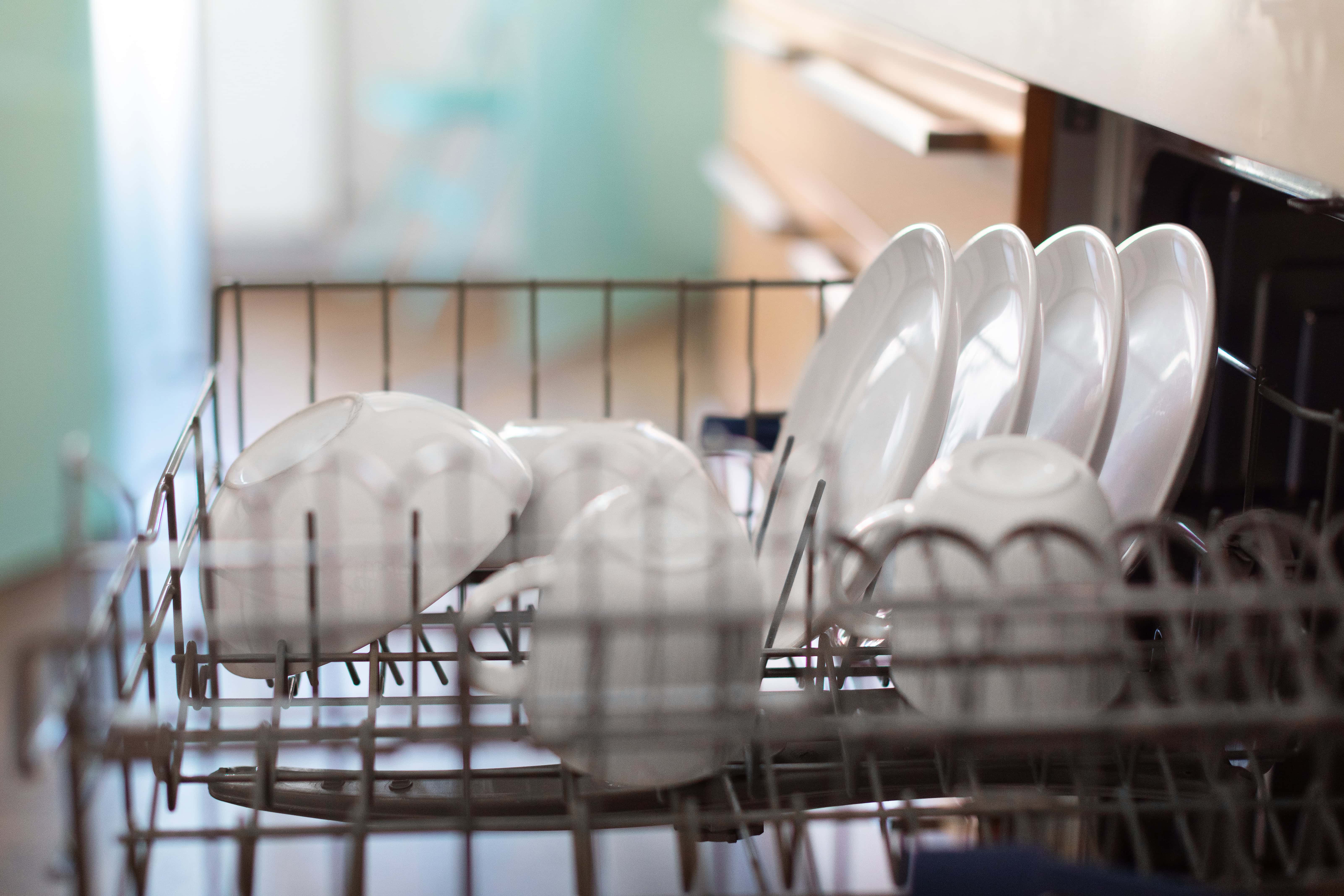How to Fix Standing Water in Dishwasher
-
 By
Ethan Clarke
By
Ethan Clarke

Standing water in a dishwasher is a sign of drainage problems that are often caused by blockages or mechanical failures. On this page, we’ll demonstrate how to quickly troubleshoot and resolve these issues, allowing your dishwasher to drain properly and operate efficiently.
Table of Contents
ToggleCommon Causes of Dishwasher Standing water
Understanding the cause of the problem is the first step to fixing it. The most common culprits are:
- Clogged filters
- Blocked drain hoses
- Malfunctioning drain pumps
- Garbage disposal issues
All of these issues interfere with the dishwasher’s ability to drain properly, leading to water in the bottom of the machine.
Clogged Filters
The filter is designed to capture food particles and other debris to prevent them from entering the drain.
Over time, however, these particles can build up, obstructing the filter and hindering the drainage of water.

Indications of a clogged filter include a foul odor, gritty dishes after a cycle, and of course, water pooling in the bottom of the machine.
Regular cleaning can help prevent this issue. It is recommended to clean the filter once a week or twice a month if the dishwasher is used regularly.
Blocked Drainage Hoses
The drain hose is the path through which the dishwasher drains water. If it’s blocked, water won’t be able to flow through, resulting in a pool of water at the bottom of the appliance.
Malfunctioning Drain Pumps
The dishwasher’s drain pump is vital for removing water from the dishwasher. It operates by using an impeller to propel the water through the drain hose. If the pump malfunctions, it can lead to inefficient water removal.
Indications of a malfunctioning drain pump include poor draining, the dishwasher halting during the drain cycle, and the lack of continuity in the pump motor when tested with a multimeter. If you encounter these signs, it’s time to inspect the pump and possibly replace it.
Garbage Disposal Issues
If the garbage disposal is clogged with food particles or other debris, it can obstruct the drainage pathway, leading to excess water. So, if you notice food stuck in your sink or any clogs, your garbage disposal might be the culprit.
How to Fix Standing Water in the Dishwasher
While some issues may require professional assistance, many can be resolved at home with a bit of elbow grease. The key lies in regular maintenance and swift action at the first sign of a problem.
Cleaning the Dishwasher Filter
Cleaning the dishwasher filter can be a simple and effective solution for pooling water.
Step 1: Remove the Filter

Remove the filter from the dishwasher – it’s typically located at the bottom of the machine.
Step 2: Rinse With Water

Rinse the filter with water and scrub off any residue with a soft bristle brush before putting it back.
Step 3: Run a Dishwasher Cycle

If necessary, you can also run a hot water cycle with white vinegar in the dishwasher before and after replacing the filter.
Supply:
- Water
- Soft bristle brush
- White vinegar (optional)
Regular cleaning will not only prevent standing water but will also enhance the overall performance of your dishwasher.
Inspecting and Clearing the Drain Hose
A blockage in the drain hose can prevent water from draining properly, leading to standing water. To clear the blockage, you can use a plunger or, if necessary, disconnect and clean the hose with a vinegar and baking soda mixture.
Supplies:
- Flashlight (optional)
Step 1:
Follow the drain hose from the dishwasher to where it connects under the sink. Use a flashlight, if necessary.

Step 2:
Look for any signs of blockages, kinks, or damage. If you find any, clear it out and ensure the hose is properly installed.

Water should be able to flow freely as long as the drain hose is clear of debris.
Troubleshooting the Drain Pump
A malfunctioning drain pump could be responsible for the excess water in your dishwasher. Fortunately, there are ways to troubleshoot the drain pump at home before calling a professional.
Supplies:
- None

Step 1:
Check for unusual noises during the wash cycle, particularly the drain cycle.
If the pump is silent or the dishwasher stops during the drain cycle, you may have a problem.

Step 2:
Examine the drain hose, drain valve, and drain line for clogs, and ensure the pump motor is receiving power.

Step 3:
Finally, inspect the impeller for damage. If the impeller is undamaged and there are no clogs, the pump may need replacement.
Addressing Garbage Disposal Problems
Start by running the disposal to clear any food debris. If it’s full, clean it out and clear the connected drain hose.
Remember to also check the following:
- The dishwasher drain hose for any kinks or clogs
- The kitchen sink drain for obstructions
- Run the disposal to observe if the sink experiences any backup when the dishwasher is running
If these steps don’t resolve the issue, you may need to use a natural cleaning mixture of vinegar and baking soda to break down food waste.
Tips for Avoiding Standing Water
Regular maintenance can prevent excess water from pooling and keep your dishwasher running smoothly.
Here are some preventative maintenance tips:
Regular Cleaning
Cleaning your dishwasher every three to six months can prevent clogs and maintain its efficiency.
Remember to clean all components, including the filter and spray arms. A deep cleaning routine includes removing and cleaning the filter, running a hot water cycle with vinegar, and scrubbing the spray arms with warm soapy water.
ACTIVE Dishwasher Cleaner
Cleaning your dishwasher with ACTIVE can help prevent clogs that lead to standing water.

15% Off Your Order on Amazon
×Click below to reveal the 15% off coupon for your entire ACTIVE purchase on Amazon.com
Proper Loading
Loading the dishwasher properly also plays a significant role in preventing the problem. Correctly positioned dishes will allow water jets to circulate freely and reach all surfaces, preventing blockages that can disrupt proper cleaning and draining.

Here are some common mistakes that people make when loading the dishwasher:
- Not pre-rinsing the dishes before loading
- Improper placement of cookware and dinnerware
- Not placing the items at an angle
- Obstructing the spray arms
- Overloading the dishwasher
Using the Right Detergent
Some detergents can cause residue buildup, which can lead to clogs and standing water.
Generally speaking, powder and gel detergents are the best options for preventing clogs as they are less likely to cause residue buildup.
Remember, using regular dish soap in a dishwasher can lead to excessive sudsing and potential damage to the machine.
Signs It’s Time to Call a Professional
If you’ve tried all the DIY solutions but are still experiencing standing water, unusual noises, or leaks, it may be time to call in the experts. Here are some signs that it’s time to contact the professionals:
Persistent Standing Water
Persistent standing water can damage both your dishwasher and dishes and can also facilitate the growth of harmful bacteria.
If you’ve cleaned the filter and drain hose, troubleshooted the drain pump, and addressed garbage disposal issues, but the water remains, there may be a more significant drainage issue at hand.
In cases like that, it’s best to call in the professionals.
Unusual Noises or Leaks
Unusual noises or leaks can indicate a more serious problem with your dishwasher that requires professional attention.
For example, loud squealing or grinding noises, high-pitched or buzzing noises, grinding or droning noises, and scraping sounds are all indications of potential issues that require professional assistance.
Electrical Concerns

Electrical issues can be dangerous and should be addressed by a professional to ensure the safety and proper functioning of your dishwasher.
These concerns may arise from a variety of factors such as a tripped circuit breaker due to electrical overload or faulty wiring within the dishwasher. These issues can result in the dishwasher failing to start, increased power consumption, frequent circuit breaker trips, burnt odors, and potential damage to electrical components.
Making Sure Your Dishwasher Drains Properly
Standing water in your dishwasher is a common issue that can be caused by clogged filters, blocked drain hoses, malfunctioning drain pumps, and garbage disposal issues.
However, with regular maintenance, proper loading, and the right detergent, you can prevent this issue. If you encounter persistent standing water, unusual noises, leaks, or electrical concerns, it’s time to call a professional. Remember, prevention is better than cure, and regular maintenance is the key to a smoothly running dishwasher.
Key Takeaways
- Standing water in dishwashers can be caused by clogged filters, blocked hoses, malfunctioning drain pumps, or garbage disposal issues, hindering proper drainage
- Solutions for standing water include cleaning the dishwasher filter, inspecting and clearing the drain hose, troubleshooting the drain pump, and addressing garbage disposal problems
- If persistent standing water, unusual noises, leaks, or electrical issues occur after DIY fixes, it’s time to call a professional to diagnose and resolve the more significant underlying problems
Frequently Asked Questions
How do I get rid of standing water in my dishwasher?
You can manually remove the excess water by placing absorbent towels on the bottom to soak it up.
Why is there water in the bottom of my dishwasher?
The water at the bottom of your dishwasher is likely due to a clogged drainage system from food particles or a dirty filter.
How do I force my dishwasher to drain?
To force your dishwasher to drain, press and hold the cancel button for at least 3 seconds to reactivate the drain mechanism. If that doesn’t work, turn off the power and manually drain the dishwasher.
How do you unblock a dishwasher drain?
To unblock a dishwasher drain, you can use a DIY mixture of equal parts baking soda and vinegar. Simply pour it into the drain, let it sit for 15-30 minutes, and then rinse with hot water.
This natural solution will help dissolve food and grease residues, allowing the dishwasher to drain properly again.
How often should I clean my dishwasher filter?
You should clean dishwashers with manual-clean filters at least once a month, or more often if needed.
SAVE
15% off
Your Next ACTIVE
Purchase on Amazon
15% Off Your Order on Amazon
×Click below to reveal the 15% off coupon for your entire ACTIVE purchase on Amazon.com
Limited Time Offer




